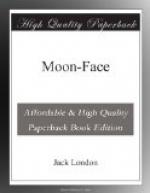I could do nothing, so I sat up, fascinated and powerless, and watched the struggle. The noonday sun beat down with dazzling brightness on the naked tennis court. And it was naked. All I could see was the blotch of shadow and the rainbow flashes, the dust rising from the invisible feet, the earth tearing up from beneath the straining foot-grips, and the wire screen bulge once or twice as their bodies hurled against it. That was all, and after a time even that ceased. There were no more flashes, and the shadow had become long and stationary; and I remembered their set boyish faces when they clung to the roots in the deep coolness of the pool.
They found me an hour afterward. Some inkling of what had happened got to the servants and they quitted the Tichlorne service in a body. Gaffer Bedshaw never recovered from the second shock he received, and is confined in a madhouse, hopelessly incurable. The secrets of their marvellous discoveries died with Paul and Lloyd, both laboratories being destroyed by grief-stricken relatives. As for myself, I no longer care for chemical research, and science is a tabooed topic in my household. I have returned to my roses. Nature’s colors are good enough for me.
ALL GOLD CANYON
It was the green heart of the canyon, where the walls swerved back from the rigid plan and relieved their harshness of line by making a little sheltered nook and filling it to the brim with sweetness and roundness and softness. Here all things rested. Even the narrow stream ceased its turbulent down-rush long enough to form a quiet pool. Knee-deep in the water, with drooping head and half-shut eyes, drowsed a red-coated, many-antlered buck.
On one side, beginning at the very lip of the pool, was a tiny meadow, a cool, resilient surface of green that extended to the base of the frowning wall. Beyond the pool a gentle slope of earth ran up and up to meet the opposing wall. Fine grass covered the slope—grass that was spangled with flowers, with here and there patches of color, orange and purple and golden. Below, the canyon was shut in. There was no view. The walls leaned together abruptly and the canyon ended in a chaos of rocks, moss-covered and hidden by a green screen of vines and creepers and boughs of trees. Up the canyon rose far hills and peaks, the big foothills, pine-covered and remote. And far beyond, like clouds upon the border of the slay, towered minarets of white, where the Sierra’s eternal snows flashed austerely the blazes of the sun.
There was no dust in the canyon. The leaves and flowers were clean and virginal. The grass was young velvet. Over the pool three cottonwoods sent their scurvy fluffs fluttering down the quiet air. On the slope the blossoms of the wine-wooded manzanita filled the air with springtime odors, while the leaves, wise with experience, were already beginning their vertical twist against the coming aridity of




